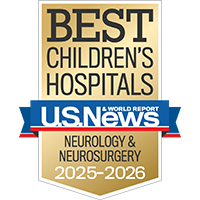Smell the roses
Wander outside into our Butterfly Garden in Oakland and our healing gardens at Mission Bay.


Moyamoya disease is a rare disorder in which the internal carotid arteries – blood vessels that carry oxygen-rich blood to the brain – narrow over time. If left untreated, the vessels can become blocked and cause a stroke or recurring "mini-strokes" called transient ischemic attacks (TIAs). In adults, moyamoya can cause hemorrhagic strokes (bleeding in the brain).
The disease was first described in Japan and gets its name, which translates to "puff of smoke," from its appearance on imaging exams. To compensate for the blocked vessels, the body creates networks of small blood vessels, which resemble puffs of smoke when viewed on an cerebral angiogram. These new blood vessels are fragile and therefore susceptible to bulging or breaking open.
Moyamoya disease typically affects children, teenagers and young adults, although it can also occur in older adults.
The cause of moyamoya disease is unknown, but the condition can run in families and genetics are thought to play a role. Worldwide, moyamoya disease occurs more frequently in children of Japanese and Korean descent. Females are more likely to have it than males.
Children with certain disorders – such as Down syndrome, neurofibromatosis, tuberous sclerosis complex and sickle cell disease – are also affected more frequently. In these cases (when the patient also has an associated disorder), the condition is called moyamoya syndrome.
Symptoms of moyamoya include:
Your child will have a thorough physical exam with a pediatric neurologist. If moyamoya is suspected, the doctor will recommend a cerebral angiogram, which shows how blood is flowing through the brain. The doctor will look for the narrowed arteries and new, small blood vessels that characterize moyamoya.
Although there's no cure for moyamoya disease, there are treatment options. Children who experience strokes and recurrent TIAs can take aspirin and other medications to reduce the risk of future events. There are also several types of surgery used to treat moyamoya by creating a bypass for the blocked areas.
Our pediatric neurosurgeons offer two procedures for moyamoya:
UCSF Benioff Children's Hospitals medical specialists have reviewed this information. It is for educational purposes only and is not intended to replace the advice of your child's doctor or other health care provider. We encourage you to discuss any questions or concerns you may have with your child's provider.

One of the nation's best for neurology & neurosurgery

in NIH funding among U.S. neurology programs

Ranked among the nation's best in 11 specialties
Smell the roses
